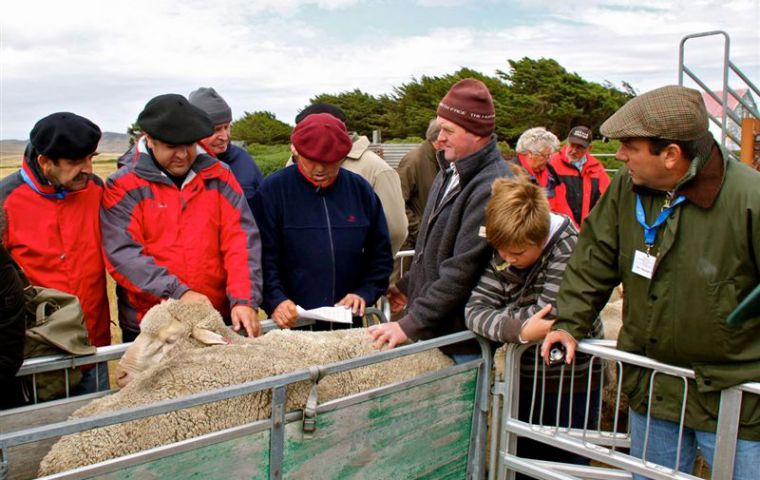MercoPress. South Atlantic News Agency
The Falklands “a fantastic corner of the world with much trade to be done”
 Members of the Uruguayan delegation at the stud flock farm at Saladero (Photo by FI_DoA)
Members of the Uruguayan delegation at the stud flock farm at Saladero (Photo by FI_DoA) “Far beyond expectations; this is a fantastic corner of the world”, said Dr. Nicolas Negrin, Head of Mission for the Uruguayan delegation describing his impression of the Falkland Islands. The 19 member Uruguayan business delegation spent a week in the Falklands and left on Saturday with impressions considerably different to those they had arrived with.
Whilst the weather might have presented some contrast to temperatures in the high 30’s currently prevailing in Uruguay, the delegation – predominantly composed of sheep and cattle farmers, breeders and exporters - found much that was familiar as well.
The full program laid on for them by staff at the Department of Agriculture incorporated visits to farms, the meat-processing plant at Sand Bay and the stud flock farm at Saladero where they encountered a level of agricultural activity that they had not really expected.
“I was expecting the land to be drier, worse for cattle and sheep” commented D’Jalma Puppo from Estancias Puppo and Martinicorena, Chairman of the Uruguayan Wool Secretariat: “The wool is of good quality, very white with a long staple and fine. And there are no lice and little problems with parasites.”
Both men were impressed too by the dedicated shearing sheds – not common in Uruguay – and compared the speed and skill of shearing methods to Australian standards.
Of particular interest to the delegation was to have the opportunity to identify the assets and the challenges of the Falkland Islands agricultural industry. Mission leader, vet and cattle reproduction specialist, Dr. Nicolas Negrin, commented that some of the critical strengths of the Islands lay in the level of land availability and the potential for growth.
“You have two very important points of development” he explained, “firstly the meat-processing facility at Sand Bay which allows farmers to diversify between wool and meat, and secondly Saladero, the stud flock farm which produces fantastic sheep and good cattle herds. The services of the Department of Agriculture are key in helping the farming community to obtain access to high-quality genetics and technical services and they do an excellent job.”
All members of the delegation recognized the challenges faced by the Islands farming community. Harnessing water supply, improving grass quality by increased paddock division and providing more and better shelter for animals through the cultivation of trees were areas that would hugely improve farm productivity. Dr. Negrin was aware that these objectives already form part of most farmer’s development plans and he says “no-one can give any recipes, only emphasize where the challenges lie. And Falkland Island farmers are on the right track.”
Members of the delegation seemed satisfied that the visit was a potential launching ground for considerable exchange of ideas and trade between the two countries.
“I take with me new friendships and the potential to sell Polwarth genetics to the Islands. If the shipping logistics can settle, meat exports will have a great future in the Islands”, said Mr. Martinicorena.
Falkland Islanders hope to have an opportunity for a return visit later in the year where some of the friendships and commercial ideas can be more concretely established. With encouragement received from the Uruguayans for the developments in both sheep and cattle farming in the Islands, there is keen interest in farmers to follow up on the visit.
“There are definitely trade opportunities there”, said Paul Phillips, owner of Hope Cottage Farm, “there is an interesting potential in genetics and we can learn a lot from them. I run 200 head of cattle and I would love to see how they manage herds a hundred times the size.”
Dr. Negrin, on behalf the delegates, wished to express his gratitude to the people of the Falklands for the warm welcome they had received, and most importantly to the Department of Agriculture for the excellent programme and planning. It had been a worthwhile visit he said, “and one thing is clear: there is trade to be done.”
By Janet Robertson – SeAledPR - Stanley




Top Comments
Disclaimer & comment rules-

-

-

Read all commentsof course!!!! in a democratic system... no , as a colonial enclave!
Feb 13th, 2012 - 09:42 pm 0The Uruguayans as with the Chileans need to get out from underneath the dark shadow cast by bully Argentina. The Falkland islanders can introduce them to the Anglo world,especially Australia and New Zealand, which treats small countries with respect.
Feb 13th, 2012 - 09:50 pm 0There is a strong Chileno community in Australia which has deep roots.
democratic system? like the islander have aready?
Feb 13th, 2012 - 09:51 pm 0Commenting for this story is now closed.
If you have a Facebook account, become a fan and comment on our Facebook Page!